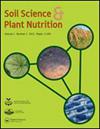The changes in the chemical forms of thallium, cobalt and manganese with air-drying of soils
IF 1.8
4区 农林科学
Q3 ENVIRONMENTAL SCIENCES
引用次数: 0
Abstract
ABSTRACT Thallium (Tl) is a highly toxic metal that induces pathological changes in organs. Many Tl-contaminated soils have been reported worldwide due to the releases of Tl from mineral weathering and mining industry. There is, however, limited information related to the dynamics and analysis of Tl in soil, since Tl is one of the emerging soil contaminants. Tl and cobalt (Co) are specifically adsorbed by manganese (Mn) oxide. On the other hand, air-drying of soils causes the dissolution of Mn oxide and the elution of heavy metals such as Co occluded by Mn oxide. Thus, the Mn oxide dissolution with air-drying is expected to affect the chemical forms of Tl with high sorption affinity to Mn oxide. We conducted the sequential extraction method using moist and air-dried soils. Air-drying caused the increases in Mn and Co in the exchangeable and acid soluble fractions, respectively, and the decreases in those in the Mn oxide occluded fraction, which is consistent with previous reports. Our research revealed that the exchangeable Tl increased and sum of the acid-soluble and Mn oxide occluded Tl decreased due to air-drying. The increments in the exchangeable fraction and the decrements in acid-soluble and Mn oxide occluded fractions were almost the same. Consequently, the increase in exchangeable Tl could be attributed to the other two fractions, indicating that soil Tl is sensitive to the soil drying.土壤风干后铊、钴和锰化学形态的变化
铊(Tl)是一种高毒性金属,可引起器官病理变化。由于矿物风化和采矿业释放的稀土,在世界范围内已报道了许多稀土污染土壤。然而,由于土壤中Tl是一种新兴的土壤污染物,因此与土壤中Tl的动力学和分析有关的信息有限。氧化锰(Mn)对Tl和钴(Co)具有特异性吸附作用。另一方面,土壤的风干导致氧化锰的溶解和氧化锰所封闭的Co等重金属的洗脱。因此,在空气干燥过程中Mn氧化物的溶解有望影响对Mn氧化物具有高吸附亲和力的Tl的化学形态。采用湿法和风干法分别进行了顺序提取。空气干燥导致交换态和酸溶态Mn和Co含量增加,而氧化锰闭塞态Mn和Co含量减少,这与前人的报道一致。我们的研究表明,由于空气干燥,交换性Tl增加,酸溶性Tl和氧化锰的总量减少。交换分数的增加和酸溶分数和氧化锰堵塞分数的减少几乎相同。因此,土壤交换态钾的增加可归因于其他两个部分,说明土壤交换态钾对土壤干燥较为敏感。
本文章由计算机程序翻译,如有差异,请以英文原文为准。
求助全文
约1分钟内获得全文
求助全文
来源期刊

Soil Science and Plant Nutrition
农林科学-农艺学
CiteScore
4.80
自引率
15.00%
发文量
56
审稿时长
18-36 weeks
期刊介绍:
Soil Science and Plant Nutrition is the official English journal of the Japanese Society of Soil Science and Plant Nutrition (JSSSPN), and publishes original research and reviews in soil physics, chemistry and mineralogy; soil biology; plant nutrition; soil genesis, classification and survey; soil fertility; fertilizers and soil amendments; environment; socio cultural soil science. The Journal publishes full length papers, short papers, and reviews.
 求助内容:
求助内容: 应助结果提醒方式:
应助结果提醒方式:


